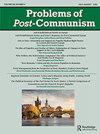The Nexus between Authoritarian and Environmental Regionalism: An Analysis of China’s Driving Role in the Shanghai Cooperation Organization
IF 2
2区 社会学
Q2 POLITICAL SCIENCE
引用次数: 9
Abstract
ABSTRACT This article explores the growing environmental activism of nondemocratic regional organizations (NDROs) by investigating the case of the Shanghai Cooperation Organization (SCO), addressing the following questions: What explains the emergence of environmental regionalism in the SCO? What are its characteristics and effects? We show that China has acted as the driver of environmental regionalism in the SCO —whose members rank among the world’s top CO2 emitters— providing positive incentives for the establishment of regional environmental institutions and fostering member states’ green energy transition through the top-down deployment of Chinese financial institutions and construction companies. In so doing, China has sought to consolidate its regional leadership in Eurasia, while promoting its economic statecraft and its bid for global environmental leadership.威权主义与环境地区主义的关系——中国在上海合作组织中的推动作用分析
摘要本文通过对上海合作组织的调查,探讨了非民主区域组织日益增长的环境行动主义,并提出了以下问题:是什么解释了环境区域主义在上海合作组织中的出现?它的特点和效果是什么?我们表明,中国已成为上合组织环境区域主义的推动者。上合组织成员国是世界上二氧化碳排放量最大的国家之一,通过自上而下部署中国金融机构和建筑公司,为建立区域环境机构和促进成员国绿色能源转型提供了积极激励。通过这样做,中国寻求巩固其在欧亚大陆的地区领导地位,同时促进其经济治国方略和争取全球环境领导地位。
本文章由计算机程序翻译,如有差异,请以英文原文为准。
求助全文
约1分钟内获得全文
求助全文
来源期刊

Problems of Post-Communism
POLITICAL SCIENCE-
CiteScore
4.00
自引率
12.50%
发文量
33
期刊介绍:
The post-communist countries are the most rapidly changing societies of Europe and Asia. For insight into this twenty-first century revolution, there is no better source than Problems of Post-Communism. Emphasis is placed on timely research covering current economic, political, security, and international developments and trends in Russia and China, Central Europe and Central Asia, Latin America, and Southeast Asia. Clarity and readability make the articles fully accessible to researchers, policy makers, and students alike.
 求助内容:
求助内容: 应助结果提醒方式:
应助结果提醒方式:


